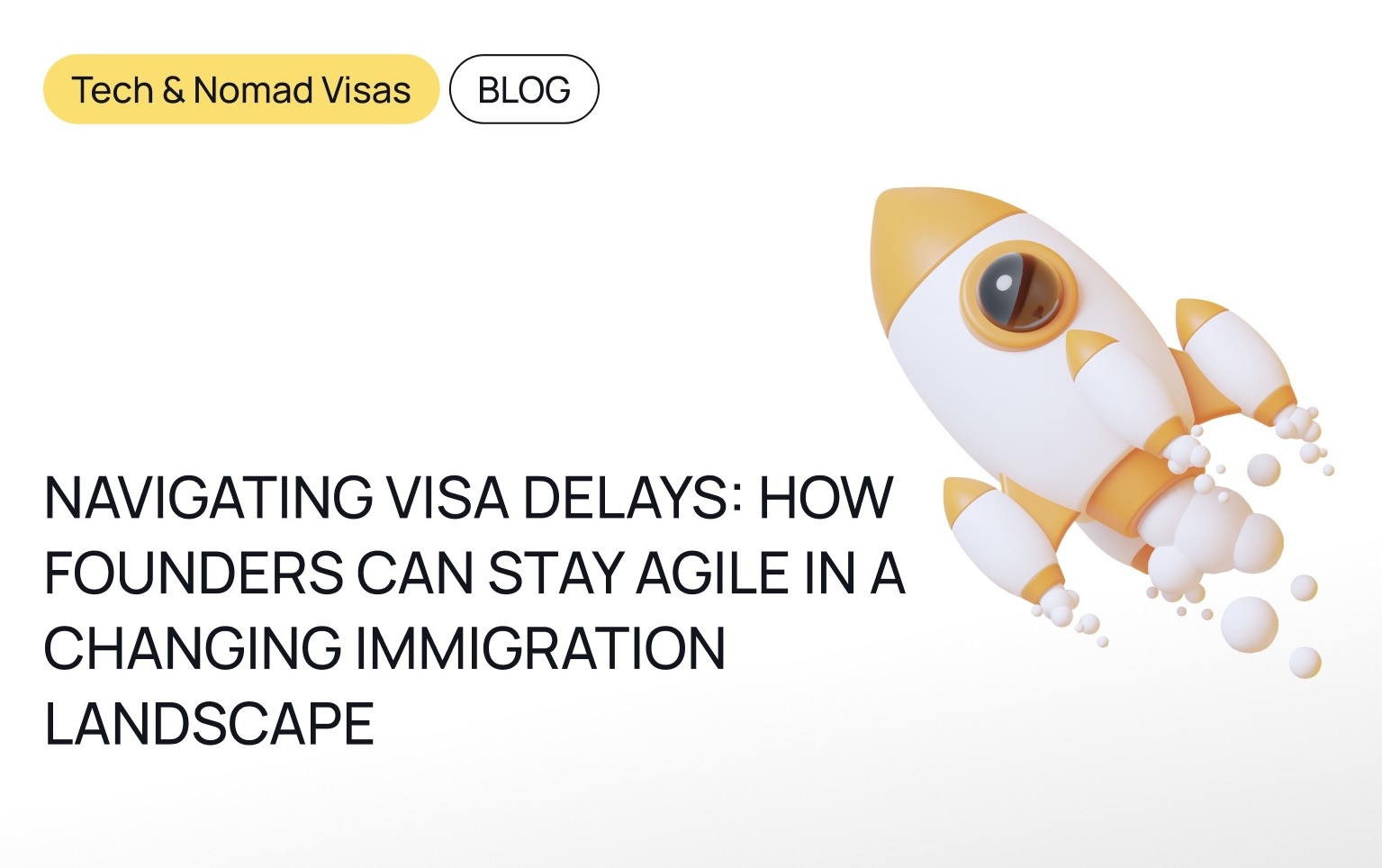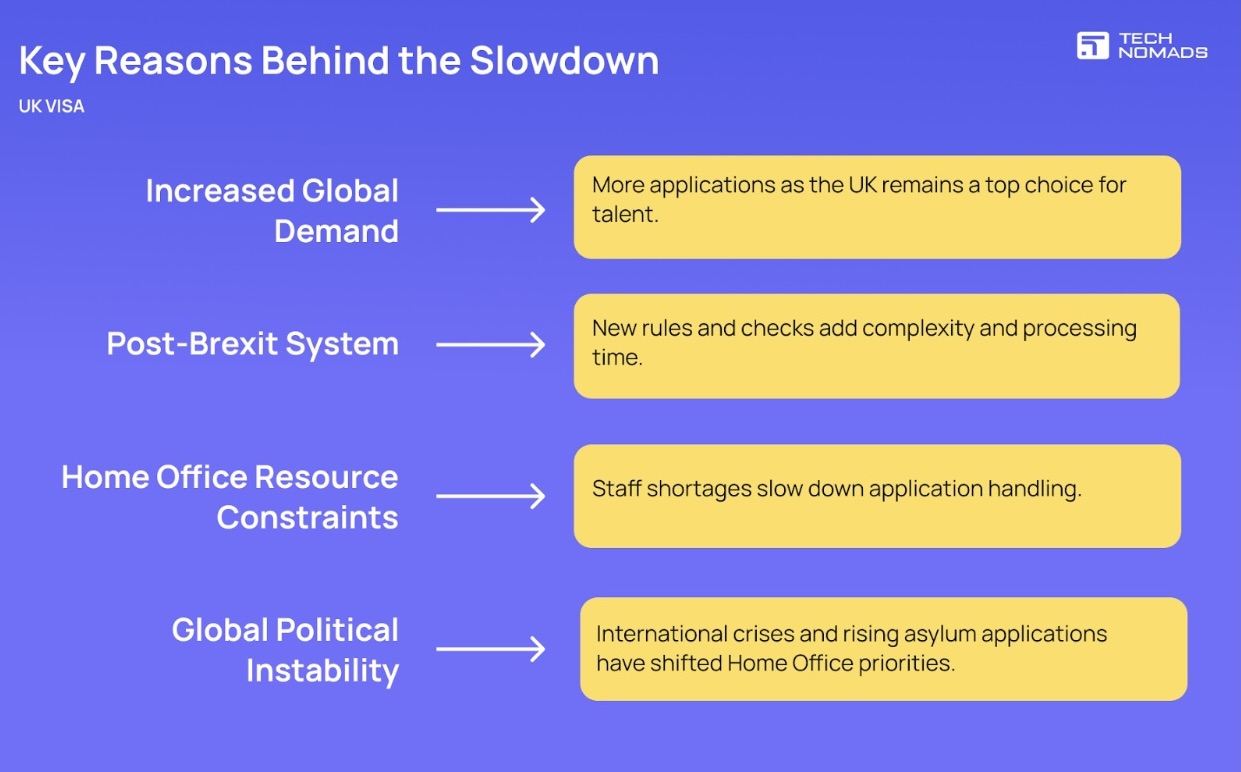
Seek more insights? Subscribe to our Monthly Newsletter
In today’s post-Brexit and post-pandemic world, the UK’s immigration system is more complex—and slower—than ever before. Whether you’re a tech founder setting up a UK base, scaling a global startup, or relocating talent, visa processing times can disrupt even the most strategic expansion plans. Delays are no longer an exception—they’re the norm.
With growing backlogs, evolving policy guidance, and stricter evidentiary requirements, staying agile has become essential. This article examines how founders can navigate delays across key UK visa routes, adjust their timelines, and make informed decisions when interacting with the Home Office.
Visa delays are nothing new in the UK immigration landscape, but 2025 has seen a significant escalation in processing times and unpredictability. For founders and entrepreneurs looking to establish or grow their ventures in the UK, these delays are disrupting on multiple fronts—from hiring key talent to meeting critical business deadlines. Understanding the root causes is crucial to navigating this challenging environment.

For founders, time is often their most valuable asset. Delays in visa approvals can stall business operations, delay recruitment, and even risk losing investor confidence. For example, securing a visa for a key technical hire may take months longer than anticipated, forcing teams to operate below capacity or outsource critical roles.
Moreover, prolonged uncertainty affects personal and professional planning. Founders may struggle with travel restrictions, miss vital networking events, or face challenges in securing office space and partnerships without the right legal status.
The traditional expectation of visa turnaround times has become unreliable. Whereas a Skilled Worker visa might have been processed in three weeks a few years ago, it now often takes six to eight weeks or longer. More specialised routes, such as the Innovator Founder visa, which require detailed business plans and endorsements, can take three to four months—or even longer in complex cases.
In this evolving landscape, founders must embrace agility. This means building contingency plans around visa timing, diversifying recruitment strategies, and staying informed of changing Home Office guidance. Being proactive—such as applying well in advance and ensuring documentation is comprehensive—can help mitigate some of the challenges.
Ultimately, understanding why delays are hitting harder in 2025 equips founders to better manage expectations and design immigration strategies that support sustainable growth, even amid uncertainty.
The Risks Of Waiting Too Long To Relocate
In an uncertain visa climate, it’s tempting to delay relocation plans until every piece is perfectly in place. But in 2025, waiting too long to relocate—whether to London, Manchester, or any of the UK’s innovation hubs—can expose founders to a range of unintended risks that may hinder growth, credibility, and operations.
Startups thrive on momentum, and in a global market, timing can define your competitive edge. Visa delays are disruptive, but failing to plan proactively around them can cost you more than time—it can undermine your position in the market.
What’s at Stake
1. Missed Funding Windows
Many investors today expect founders to be physically present in the UK. Whether it's for pitching rounds, in-person meetings, or onboarding into accelerator programmes, local presence still matters. Delaying relocation can mean missing critical fundraising cycles or losing investor interest entirely—especially if competitors are already on the ground.
2. Delaying Your Team’s Growth
Hiring is one of the first casualties of relocation delays. If you're building a core team in the UK, not being physically present can slow decision-making, delay onboarding, or create uncertainty about company direction. Talented hires may accept competing offers rather than wait out an unpredictable timeline.
3. Time Zone & Operational Inefficiencies
Running a business remotely from another time zone—while waiting for your visa to clear—may work for a short while. But in the long term, it impacts productivity, team morale, and your ability to build a strong internal culture. Clients and partners also tend to prefer local presence, especially in early-stage B2B ventures.
4. Regulatory & Tax Complexity
Operating a UK entity while residing abroad can trigger complications. From residency-based tax obligations to regulatory filings and director responsibilities, staying offshore for too long can create compliance risks for both the company and the individual founder. These risks often go unnoticed until they become expensive to resolve.
5. Weakened Market Positioning
In sectors like fintech, AI, or climate tech—where timing and visibility matter—being physically absent can hurt your credibility. Founders who are slow to enter the market may find themselves overtaken by faster-moving competitors who have secured partners, talent, and media visibility while they're still stuck in transit.
6. Higher Relocation Costs
Waiting too long often leads to rushed moves. You might end up paying for premium legal services, emergency housing, expedited visa services (if available), or interim travel to meet business obligations. These short-term fixes can significantly increase your burn rate and distract from business priorities.
When delays or refusals affect your primary visa route, having a backup plan can make all the difference. In 2025, many founders are exploring alternative UK visa pathways that provide greater flexibility, quicker turnaround times, or less administrative burden. Here are some of the most practical alternatives to consider:
1. Skilled Worker Visa
If your startup holds a UK sponsor licence, this route allows you to sponsor yourself (as a founder) or key team members. It’s a structured and relatively stable route with defined processing timelines. While it involves some upfront admin, it can serve as a practical alternative if business visas are delayed.
2. Global Talent Visa
This is a strong option for founders with a proven track record in tech, innovation, or academia. If you receive an endorsement from a recognised UK body (such as Tech Nation or equivalent successors), you can apply without needing a sponsor. It’s faster than many business visas and grants greater flexibility in work and residency.
3. UK Expansion Worker Visa
This route is suitable for founders or senior executives establishing the first UK branch of an overseas business. While it requires a UK footprint and an overseas presence, it can be a solid route for entering the market and building operations on the ground.
4. Start-up Visa
Although this route is being phased out, those switching from previous categories (e.g. graduates, Youth Mobility participants) may still access it under transitional arrangements. It offers a short-term option to launch a business, with a pathway to longer-term visas later.
5. Youth Mobility Scheme
Open to 18–30-year-olds from eligible countries (such as Australia, Canada, New Zealand, Japan, and others). While it doesn’t allow formal self-employment, it can provide a temporary stay while preparing or applying for a more suitable visa.
6. Standard Visitor Visa
Though not a long-term solution, this can be used for short visits to the UK—such as meetings, networking, or scouting locations. However, it’s crucial to remember that you cannot work or run a business on this visa, so it’s only useful for preparatory travel.
Choosing the Right Alternative
The best backup route depends on your nationality, stage of business, and how quickly you need to be in the UK. In some cases, founders are using the Global Talent visa as a more individualised route, particularly when business visa backlogs become too risky. Other companies choose to sponsor themselves under the Skilled Worker route once they secure a sponsor licence, which opens the door not only for the founder but for key hires.
How To Keep Building While Your Visa Is Stuck
A delayed visa doesn't have to mean delayed progress. While you're waiting on Home Office decisions, there are several practical ways to continue moving your business forward—even from abroad. The key is to adapt your operational model and use the waiting period strategically.
Design your startup to function without geographic constraints. Use collaboration tools like Slack, Notion, and Zoom to maintain communication and momentum. Define clear workflows and responsibilities for your UK-based and international team members.
You can still register your company in the UK and begin basic operations. Many founders set up a UK limited company, open a business bank account, and even engage local service providers—all before physically relocating. Legal representation or a company secretary can help manage this process on your behalf.
If you can't sponsor employees yet, consider using an Employer of Record (EoR) service to legally hire UK-based staff. This gives you a head start on team-building without needing to hold a sponsor licence immediately.
Use the waiting period to build relationships with local stakeholders. Apply to UK accelerator programmes, schedule virtual investor meetings, and attend digital events hosted by tech hubs in London, Manchester, Cambridge or beyond. Demonstrating ongoing engagement helps build credibility and prepares the ground for a smoother landing once you're in-country.
Use the time to gather stronger documentation for your visa—financials, traction metrics, letters of support, endorsements, etc. Simultaneously, prepare a backup visa application in case your initial route stalls or is rejected.
This is a good time to iterate. Strengthen your pitch deck, update your business plan to reflect UK market trends, or localise your product for British consumers. If you're applying for visas like the Innovator Founder or Global Talent, this preparation also improves your supporting evidence.
Post updates on LinkedIn, Medium, or your startup’s blog to show traction, milestones, or media coverage. Immigration authorities, investors, and partners often search online when evaluating an applicant, so a strong digital footprint helps reinforce your credibility.
Need assistance with your relocation journey to the UK? Tech Nomads offers personalised strategies and full support in navigating the UK Visa processes.
Tech Nomads is a global mobility platform that provides services for international relocation. Established in 2018, Tech Nomads has a track record of successfully relocating talents and teams. Our expertise in adapting to regulatory changes ensures our clients’ satisfaction and success.
Tech Nomads Club is a curated global community for highly skilled professionals.
We host free, application-based events including expert panel talks, start-up pitch days, members-only networking, informal meetups, and fireside conversations with industry leaders.
Membership is free but selective — open to those building across borders and seeking meaningful growth through connection, knowledge, and community.
We also produce a regular podcast, sharing real stories, insights, and voices from inside the Club.
To explore your UK relocation options, you may:
Subscribe to our social media platforms to stay up-to-date on global mobility news and opportunities: